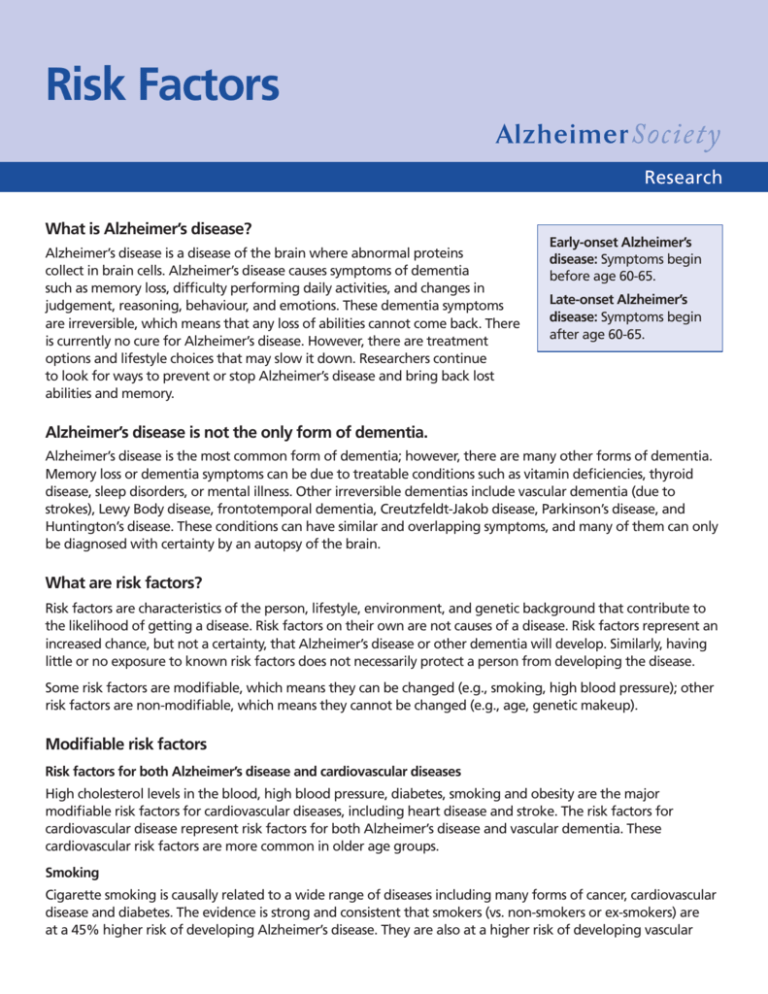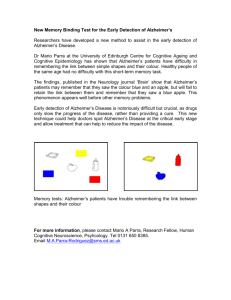
Risk Factors
Research
What is Alzheimer’s disease?
Alzheimer’s disease is a disease of the brain where abnormal proteins
collect in brain cells. Alzheimer’s disease causes symptoms of dementia
such as memory loss, difficulty performing daily activities, and changes in
judgement, reasoning, behaviour, and emotions. These dementia symptoms
are irreversible, which means that any loss of abilities cannot come back. There
is currently no cure for Alzheimer’s disease. However, there are treatment
options and lifestyle choices that may slow it down. Researchers continue
to look for ways to prevent or stop Alzheimer’s disease and bring back lost
abilities and memory.
Early-onset Alzheimer’s
disease: Symptoms begin
before age 60-65.
Late-onset Alzheimer’s
disease: Symptoms begin
after age 60-65.
Alzheimer’s disease is not the only form of dementia.
Alzheimer’s disease is the most common form of dementia; however, there are many other forms of dementia.
Memory loss or dementia symptoms can be due to treatable conditions such as vitamin deficiencies, thyroid
disease, sleep disorders, or mental illness. Other irreversible dementias include vascular dementia (due to
strokes), Lewy Body disease, frontotemporal dementia, Creutzfeldt-Jakob disease, Parkinson’s disease, and
Huntington’s disease. These conditions can have similar and overlapping symptoms, and many of them can only
be diagnosed with certainty by an autopsy of the brain.
What are risk factors?
Risk factors are characteristics of the person, lifestyle, environment, and genetic background that contribute to
the likelihood of getting a disease. Risk factors on their own are not causes of a disease. Risk factors represent an
increased chance, but not a certainty, that Alzheimer’s disease or other dementia will develop. Similarly, having
little or no exposure to known risk factors does not necessarily protect a person from developing the disease.
Some risk factors are modifiable, which means they can be changed (e.g., smoking, high blood pressure); other
risk factors are non-modifiable, which means they cannot be changed (e.g., age, genetic makeup).
Modifiable risk factors
Risk factors for both Alzheimer’s disease and cardiovascular diseases
High cholesterol levels in the blood, high blood pressure, diabetes, smoking and obesity are the major
modifiable risk factors for cardiovascular diseases, including heart disease and stroke. The risk factors for
cardiovascular disease represent risk factors for both Alzheimer’s disease and vascular dementia. These
cardiovascular risk factors are more common in older age groups.
Smoking
Cigarette smoking is causally related to a wide range of diseases including many forms of cancer, cardiovascular
disease and diabetes. The evidence is strong and consistent that smokers (vs. non-smokers or ex-smokers) are
at a 45% higher risk of developing Alzheimer’s disease. They are also at a higher risk of developing vascular
dementia (although the evidence is not quite as strong) and even other forms of dementia. Also, ex-smokers
reduce their risk by not smoking. This is an encouraging finding for dementia prevention, suggesting, as with
other adverse impacts of smoking, that the increased risk of dementia can be avoided by quitting smoking.
High blood pressure
People who have high blood pressure (hypertension) in midlife are on average more likely to develop dementia
compared to those with normal blood pressure. High blood pressure affects the heart, the arteries and blood
circulation so it increases the risk of developing Alzheimer’s disease, particularly vascular dementia. Research
has shown that treating high blood pressure with physical activity and improvements in diet can bring the risk
down, if this is not successful, appropriate medications can also help.
Diabetes
Research has shown that type 2 diabetes in midlife is associated with increased risk of Alzheimer’s disease,
vascular dementia and cognitive impairment. In fact, people who have type 2 diabetes are, on average, twice as
likely to develop dementia compared to those without diabetes.
High cholesterol
People with high total cholesterol levels in midlife are on average more likely to develop dementia compared
to those with normal total cholesterol. Research has shown that people who have their high cholesterol treated
with drugs called “statins” have a lower risk of dementia. So treating high cholesterol is important for both
heart and brain health. High cholesterol is an important risk factor for hypertension and diabetes and also
contributes independently to cardiovascular risk.
Obesity and lack of physical activity
Both obesity and lack of physical activity are important risk factors for diabetes and high blood pressure, and
should, therefore, also be taken into consideration. Obesity in midlife may increase the risk of dementia and
Alzheimer’s disease and, for that reason, should also be addressed.
Other risk factors
Alcohol
Alcohol is ranked fifth among the most important risk factors for death and disability worldwide and it has
been implicated as a causal factor for more than 200 diseases and injuries, including major non-communicable
diseases such as liver cirrhosis, some cancers and cardiovascular disease.
People who drink moderate amounts of alcohol have the lowest risk of developing dementia. Those who don’t
drink any alcohol at all have a slightly higher risk. Those who drink excessively have the highest risk.
Low levels of formal education
Research shows that education lowers the risk of dementia. The quality and quantity of education that protects
against dementia, remains to be clarified.
Depression
People who experience depression in later life or have a history of depression may also develop dementia.
However, the relationship between depression and dementia is still unclear. Many researchers believe that
depression is a risk factor for dementia, whereas others believe it may be an early symptom of the disease.
Head injuries
People who experience severe or repeated head injuries are at increased risk of developing dementia. It is
possible that deposits that form in the brain as a result of the injury may be linked to the onset of dementia.
2
© July 2015, Alzheimer Society of Canada. All rights reserved. Risk Factors
Non-modifiable risk factors
Age
Alzheimer’s disease is not a normal part of aging but age is the strongest known risk factor for Alzheimer’s
disease. This does not mean that most people develop the disease as they age. Most do not. Some younger
people, in their 40s or 50s, are diagnosed with the young (early) onset form of the disease. After the age of 65,
the risk of developing Alzheimer’s disease doubles approximately every five years. The older you become, the
higher the risk – 1 in 20 Canadians over age 65 and 1 in 4 of those over age 85 have Alzheimer’s disease.
It is well-established that aging can impair the body’s self-repair mechanisms, including in the brain. And,
many of the cardiovascular risk factors increase with age, such as high blood pressure, heart disease, and high
cholesterol.
Family history and genetics
Most Alzheimer’s disease does not run in families and is described as “sporadic”. Rare cases of Alzheimer’s
disease are inherited or “familial’.
Familial Alzheimer’s disease
Familial Alzheimer’s disease accounts for less than 5% of all cases of Alzheimer’s disease. This form of the disease
runs in families. If a person has familial Alzheimer’s disease, each of his/her children has an increased chance of
inheriting the disease-causing gene and developing Alzheimer’s disease.
Familial Alzheimer’s disease is due to changes or alterations in specific genes that can be directly passed on from
parent to child. Three familial Alzheimer’s disease risk genes have been discovered so far: the PS1, PS2, and APP
genes. If you have an alteration in any one of these genes, you will have a greater chance of developing young
(early) onset familial Alzheimer’s disease. Researchers are searching for other genes that might be associated
with familial Alzheimer’s disease.
Sporadic Alzheimer’s disease
The most common form of Alzheimer’s disease is called sporadic Alzheimer’s disease. Sporadic Alzheimer’s
disease is due to a complex combination of our genes, our environment, and our lifestyle. The single greatest
risk factor for developing sporadic Alzheimer’s disease is aging. Most cases begin after age 60-65 years.
For more detailed information about genetics and Alzheimer’s disease, read our ‘Understanding Genetics
and Alzheimer’s Disease’ information sheet at http://www.alzheimer.ca/~/media/Files/national/Research/
understanding_genetics_e.pdf.
Gender
There has been some debate that women may be more likely to develop Alzheimer’s disease than men. The
international evidence has not consistently shown this to be true. More research is required to determine if
other factors than age may heighten a woman’s chances of developing Alzheimer’s disease.
Other
Other medical conditions that can increase a person’s chances of developing dementia include Parkinson’s
disease, multiple sclerosis, chronic kidney disease and HIV. Down syndrome and some other learning disabilities
also increase a person’s risk of dementia. For information on other forms of dementia, please visit http://www.
alzheimer.ca/en/About-dementia/Dementias.
Risk Factors
© July 2015, Alzheimer Society of Canada. All rights reserved. 3
How can we reduce the risk?
A healthy lifestyle can help reduce the risk of Alzheimer’s disease and other dementias. It has been estimated
that up to half the cases of Alzheimer’s disease worldwide may be the result of seven key modifiable risk
factors: diabetes, high blood pressure, obesity, smoking, depression, cognitive inactivity or low education, and
physical inactivity.
What can I do to maintain or improve my brain health?
• Be physically active
• Avoid smoking and excessive alcohol consumption
• Track your numbers: keep your blood pressure, cholesterol, blood sugar and weight within
recommended ranges
• Stay connected socially and interact regularly with others
• Make healthy food choices, eat a well-balanced and healthy diet rich in cereals, fish,
legumes and vegetables
• Reduce stress
• Challenge your brain by trying something new, playing games or learning a new language
• Protect your head by wearing a helmet when you engage in sporting activities
For more information, visit our ‘Brain health’ section at http://www.alzheimer.ca/en/About-dementia/
Brain-health.
References
World Alzheimer Report 2014: Dementia and Risk Reduction, Alzheimer’s disease international, 2014
Am I at risk of developing dementia?, Alzheimer’s Society UK, 2014
Your brain matters, the power of prevention, Alzheimer’s Australia, 2014
The contents of this document are provided for information purposes only and do not represent advice, an endorsement
or recommendation, with respect to any product, service or enterprise, and/or the claims and properties thereof, by the
Alzheimer Society of Canada. This information sheet is not intended to replace clinical diagnosis by a health professional.
Alzheimer Society of Canada
20 Eglinton Avenue West, 16th Floor, Toronto, Ontario, M4R 1K8
Tel: 416-488-8772 • 1-800-616-8816 • Fax: 416-322-6656
E-mail: info@alzheimer.ca • Website: www.alzheimer.ca
Facebook : www.facebook.com/AlzheimerSociety • Twitter : www.twitter.com/AlzSociety
© July 2015, Alzheimer Society of Canada. All rights reserved.
R300-15E 2015








